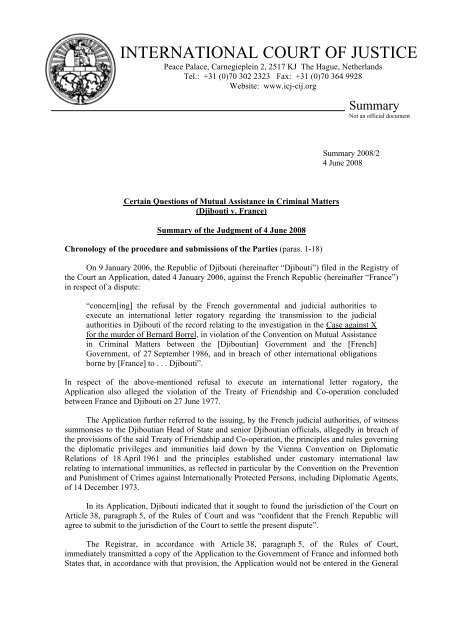A Detailed Summary of Letters Rogatory and Their Legal Implications
A Detailed Summary of Letters Rogatory and Their Legal Implications
Blog Article
The Role of Letters Rogatory in International Law: Trick Insights
Letters rogatory offer as a critical instrument in global legislation, facilitating cross-border lawful support by enabling territories to formally request proof and actions from one another. What implications might these difficulties have for future legal proceedings?
Interpretation of Letters Rogatory
In the world of global regulation, letters rogatory act as official demands released by a court in one jurisdiction to look for aid from a court in another territory. Letters rogatory. These requests are specifically significant in cross-border legal proceedings, where the enforcement of a court's order or the event of proof may be hindered because of administrative restrictions

The process usually calls for the requesting court to articulate the particular information or action required from the foreign court, sticking to the legal methods and conventions developed between the territories entailed. As soon as provided, the letters rogatory are transmitted through polite networks, which might include consular offices or consulates, to make certain that the request is acknowledged and acted on by the foreign court. Generally, letters rogatory exemplify the participating framework necessary for reliable global legal processes.
Historic Context
Although the practice of letters rogatory has ancient origins, its formalization within the structure of international law arised substantially in the 20th century. Historically, such ask for judicial help were utilized in various legal practices, including Roman regulation, where they assisted in cross-border cooperation in legal matters. The idea acquired restored attention with the rise of globalization and the boosting intricacy of international lawful interactions.
The mid-20th century saw the facility of treaties and conventions that sought to standardize the process of letters rogatory. Especially, the 1970 Hague Convention on the Taking of Proof Abroad in Civil or Industrial Issues provided a structured strategy, improving the efficiency of these demands - Letters rogatory. This period marked a change from casual arrangements to a much more systematic structure, which addressed the challenges presented by differing nationwide lawful systems
As states became a lot more interdependent, the requirement for reliable devices to collect proof across borders came to be evident, reinforcing the role of letters rogatory in facilitating international participation. Today, they remain an important tool for acquiring proof and making sure that justice transcends nationwide borders, showing the progressing nature of worldwide law in feedback to international obstacles.
Process of Issuing Demands
The procedure of providing letters rogatory generally includes numerous essential actions created to make certain that ask for judicial help are clear, certain, and certified with both international and domestic lawful standards. An event seeking assistance must prepare a formal request that details the pertinent facts of the situation, the alleviation looked for, and the specific evidence or testament required. This record needs to be crafted with accuracy to satisfy the legal requirements of the jurisdiction in which it will be sent.
Complying with the prep work of the demand, it is submitted to the appropriate authority, often a court or a designated governmental company. This authority evaluates the request to ensure it complies with step-by-step norms and lawful criteria. Once accepted, the request is transmitted to the international jurisdiction with diplomatic channels.
Upon receipt, the international court assesses the demand's compliance with its local regulations and practices (Letters rogatory). If accepted, it proceeds to implement the demand, which may involve the issuance of subpoenas or the collection of evidence. Throughout this procedure, maintaining clear communication between the requesting and obtaining territories is vital to guarantee effective teamwork and the gratification of the request
Obstacles and Limitations
Restrictions and difficulties often arise in the process of carrying out letters rogatory, often stemming from varying legal systems and treatments in between jurisdictions. One substantial challenge is the differing criteria of admissibility for evidence, which can lead to issues in the approval of documents requested through letters rogatory. In addition, the lack of harmony in lawful terms and definitions can create misconceptions, making complex interaction between courts in various nations.
Moreover, hold-ups prevail because of governmental procedures, as the request might require to go through multiple layers of lawful authorities before it is fulfilled. In some circumstances, the requested territory might do not have the required sources or determination to cooperate, even more impeding the process. Language barriers also add to difficulties, as exact translation of lawful records is vital for guaranteeing that the intended message is shared without distortion.
Last but not least, sovereignty concerns might develop, as some states are hesitant to abide by demands that they perceive as infringing upon their legal freedom. These challenges highlight the intricacies inherent in using letters rogatory, requiring greater harmonization and collaboration amongst international lawful systems this post to boost their performance.

Effect On International Cooperation
Acknowledging the relevance of letters rogatory in cultivating international participation is critical, as these requests assist in cross-border lawful assistance and promote joint initiatives in criminal and civil matters. By enabling one territory to officially request help from an additional, letters rogatory create an organized legal framework that boosts the effectiveness of worldwide communication between judicial authorities.
Making use of letters rogatory aids to establish shared count on and regard useful reference among countries, which is essential in a significantly interconnected world. They serve as a system not just for gathering evidence yet likewise for making certain that lawful processes are promoted across borders. This is specifically crucial in combating global criminal offense, where the lack of ability to protect collaboration can weaken justice.
Moreover, the dependence on letters rogatory can streamline complicated legal process, lowering hold-ups and uncertainties in worldwide investigations. The procedural safeguards integral in this procedure add to the security of specific legal rights while facilitating teamwork among states. Ultimately, the impact of letters rogatory on worldwide collaboration underscores their function as important tools in the promotion of justice, cultivating a joint spirit that transcends national limits and legal systems.
Final Thought
In final thought, letters rogatory offer as a vital tool in global regulation, helping with cross-border lawful assistance and participation. The ongoing advancement of these mechanisms is important for boosting the efficiency of global lawful procedures, inevitably cultivating stronger cooperation in both civil and criminal matters throughout territories.
Letters rogatory offer as a pivotal instrument in global regulation, promoting cross-border lawful help by enabling territories to officially request evidence and actions from one an additional.The procedure typically look at here requires the asking for court to articulate the particular info or activity required from the foreign court, adhering to the legal procedures and conventions established in between the territories included. Historically, such demands for judicial assistance were utilized in different legal traditions, consisting of Roman regulation, where they facilitated cross-border participation in lawful issues.The process of releasing letters rogatory generally involves several crucial steps made to make sure that demands for judicial assistance are clear, details, and certified with both residential and global legal standards.Moreover, hold-ups are usual due to bureaucratic processes, as the demand may require to pass through several layers of lawful authorities prior to it is fulfilled.
Report this page